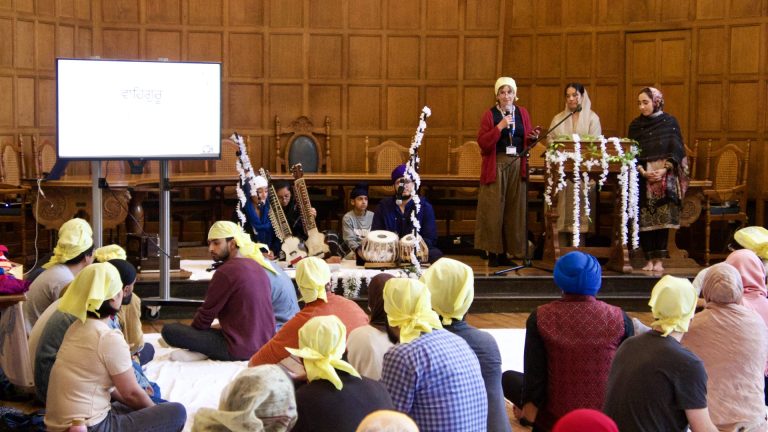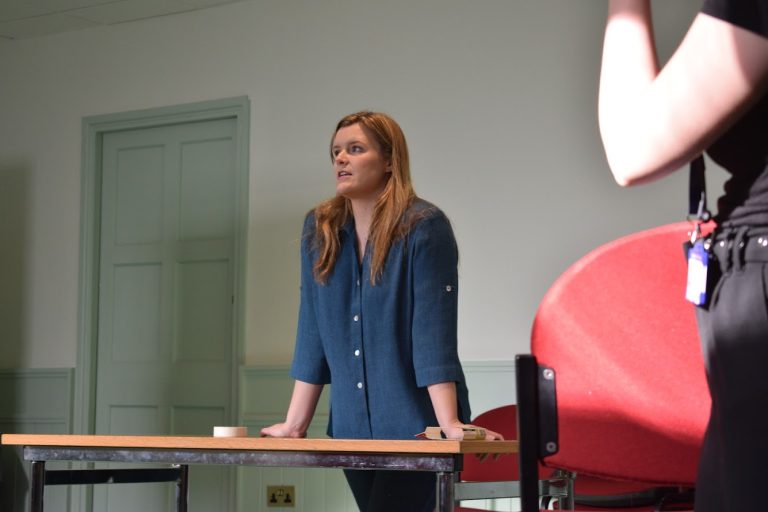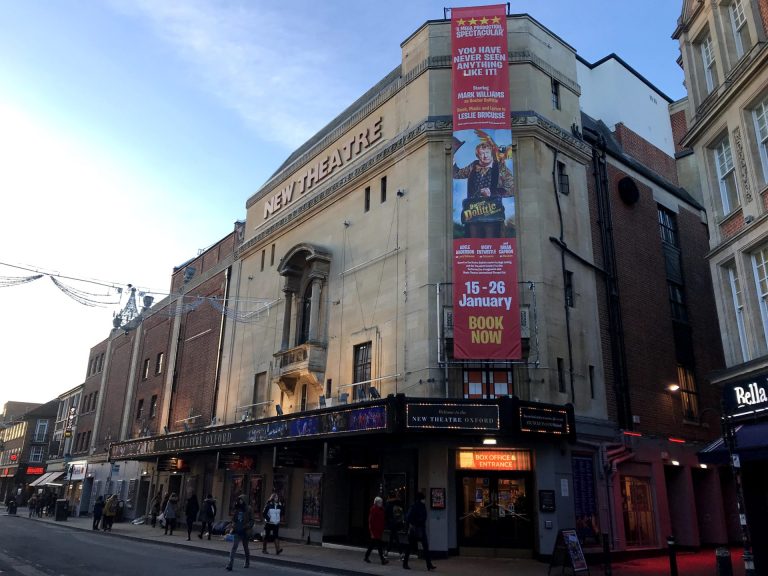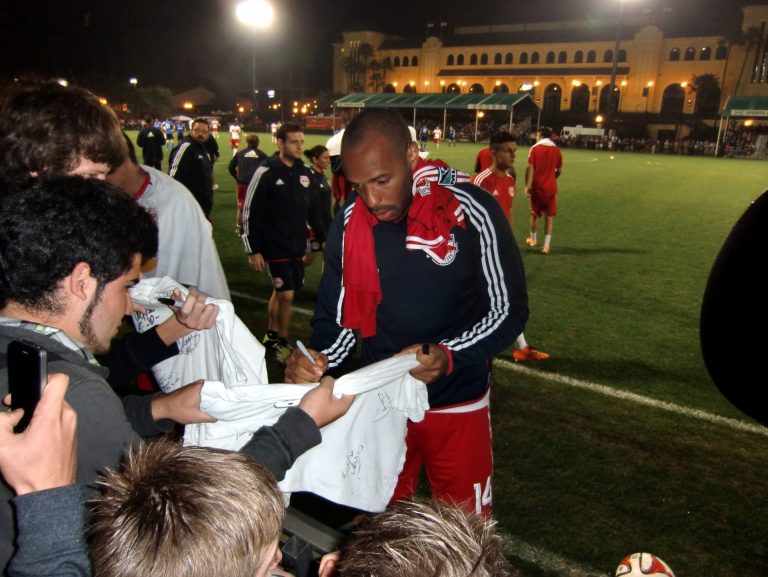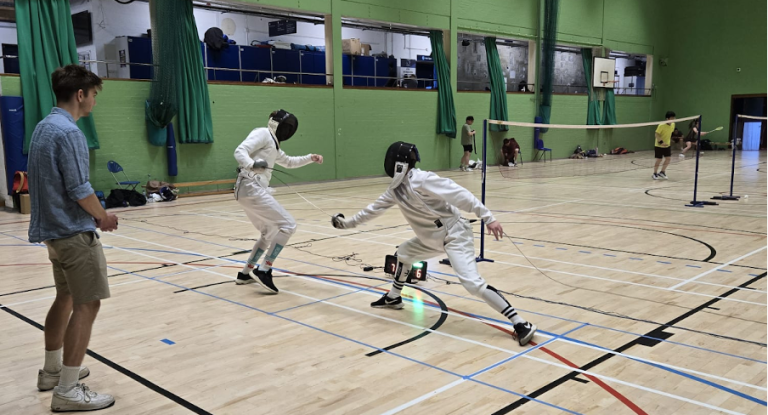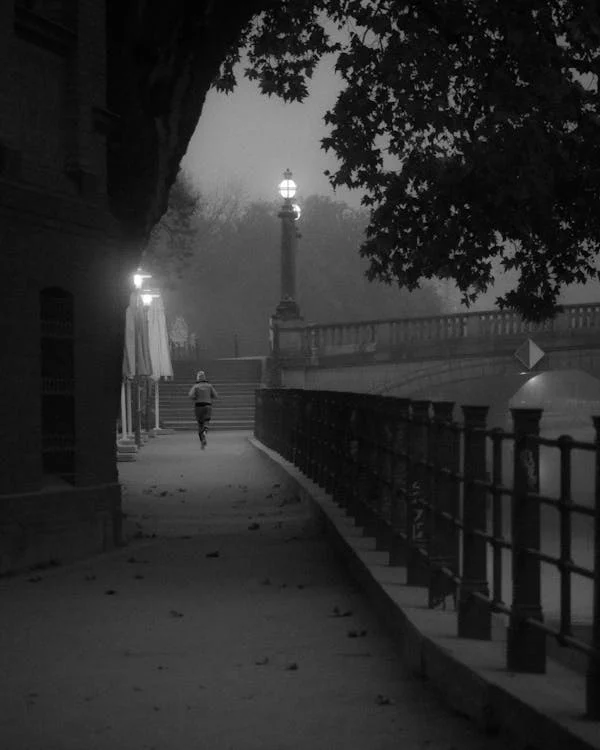When I arrived at Rhodes House, someone pointed gently to my shoes – off, please – and handed me a head covering. I was then quickly led into a very tall, very ornate hall, where the first thing that struck me wasn’t even the impressive architecture, but the rows of white sheets laid neatly across the floor.
Dozens of people sat cross-legged along them, listening quietly to a speech. As I hesitated by the doorway, someone leaned over, pointed to the mats, and whispered: “We all sit on the floor here.”
I paused. I had arrived with a backpack, a purse, a cap (which I could not wear under or over my headscarf), and was still holding my knee-high boots.
Suddenly aware of how much I’d brought with me, I tried to shove them quickly and awkwardly into a corner. I was struck by how unwieldy my belongings had made me. All around me, the hall felt calm and very intentional, stripped of excess. There was no seating plan, no obvious hosts. Just a lot of people sitting down together. From the corner of my eye, I spotted a long row of tables with metal and plastic canisters piling on them, the contents of which I could already begin to guess.
You see, this event was a Langar, the Sikh Society’s third annual one in Oxford. Langar, as I’d read when I skimmed the Wikipedia page beforehand, is a centuries-old tradition of serving free food to anyone, regardless of religion, caste, status, or background. While it began traditionally in Sikh gurdwaras, the principle at the heart of it is simple: No one gets turned away, and no one leaves hungry.
It was one thing to read about it and quite another to be sitting there, with the sound of the tabla, a set of small drums, and the dilruba, a long stringed instrument, ringing an entrancing rhythm through the room. Apparently, the name dilruba can be translated as ‘thief of the heart’.
I wanted to understand more, not just about the logistics of putting on an event like this, but about what it meant. So, before the food was served, I managed to grab and sit down with Serene Singh, a Rhodes Scholar who helped bring the first Langar to Oxford three years ago.
She talked about experience. “Sometimes we forget,” she told me, “You don’t need to teach Sikhism through books and lectures. Come experience it for yourself. You will sit on the floor in equality.”
Serene also describes Langar as an “anti-segregation movement that was started 500 years ago”. She told me: “everyone sits on the floor completely egalitarian, and everyone is served the exact same, vegetarian, simple, nutritious meal. It doesn’t matter if you’re a professor, it doesn’t matter if you’re a lord, it doesn’t matter if you are the Queen. Everyone sits alongside one another”.
This, I must attest, is something I did experience myself. At one point, when being served food, I found myself sitting next to a legal academic who had apparently that very morning had breakfast with the head tutor in my college.
I couldn’t help but ask Serene about how she had found setting up an event like this in Oxford; however much we may love it, the University does have its fair share of hierarchies. From high tables at formals to scholars’ gowns, there are levels everywhere.
“Actually, I think Oxford students have craved this type of event,” she tells me. “We say eradicate the tables. Everyone sits on the floor. It’s all One Light. There is no difference. And so, the real radical act of Sikhism is non-discrimination completely.”
I wasn’t the only one noticing the difference. Quite a few people I spoke to, whether attending their first Langar or returning for another, echoed what Serene had told me. Guests ranged from undergraduates to academics to staff, all with varying degrees of familiarity with Sikhism.
Kim, a staff member at Rhodes House, told me that what struck her most was the openness: “I think one shouldn’t be afraid of walking through a gurdwara’s door. Tonight’s langar is open to all.”
Another guest, from a Sikh family, confided that: “I don’t think I felt as at home or like I belonged in Oxford as much as I do today.”
As much as everyone was telling me that the event was about the people in the room, it was hard to ignore the elephant in the room. After all, we were sitting in the imposing hall of Rhodes House, surrounded by ten-foot-tall paintings. A meal on the floor is one thing, but a meal on the floor of one of Oxford’s most formal National Heritage sites, known for its controversial past, is something a little different.
According to Fennella Porter, the Director of the Scholar Programme at Rhodes Trust, this event began as “most of their best events have,” from the scholars. In this case, Serene herself suggested the event three years ago.
I couldn’t help but feel that there was perhaps a twinge of bitter irony in such an event being held in a building built in memory of Cecil Rhodes. “A building like Rhodes House is, sort of, originally built on hierarchical power,” said Gurkarishma Dhillon, incoming Graduate President of the Sikh Society. “But we have the power to change that. We have the power to promote unity as opposed to focusing on our differences. No place is ever stagnant.”
She gestured around the room: “People like me and you would probably not even be let into this building, right?”
“Who would’ve thought so long ago that we would all be sitting here? With the opportunity to share our faith, and share that love to others.”
Sitting there, at an event that had grown so large from the seed of one scholar’s idea, I couldn’t help but think: maybe this is what change at Oxford really looks like. Not big initiatives, not sweeping statements, just letting people in, and letting them share what matters to them.
And yes, the food was excellent. And there was a lot of it. I spotted Serene helping pass out some rice on the fourth round of helpings, who waved at me cheerfully.
Earlier on, I had asked Serene what she hoped people would carry with them after leaving this room.
“We’ll see Oxford students become prime ministers and heads of states and scientists and lawyers and judges and journalists,” Serene said. “The one thing we ask of you at Langar is, can you also take these values of equality and oneness we teach here with you in those disciplines, and out into the world?”



